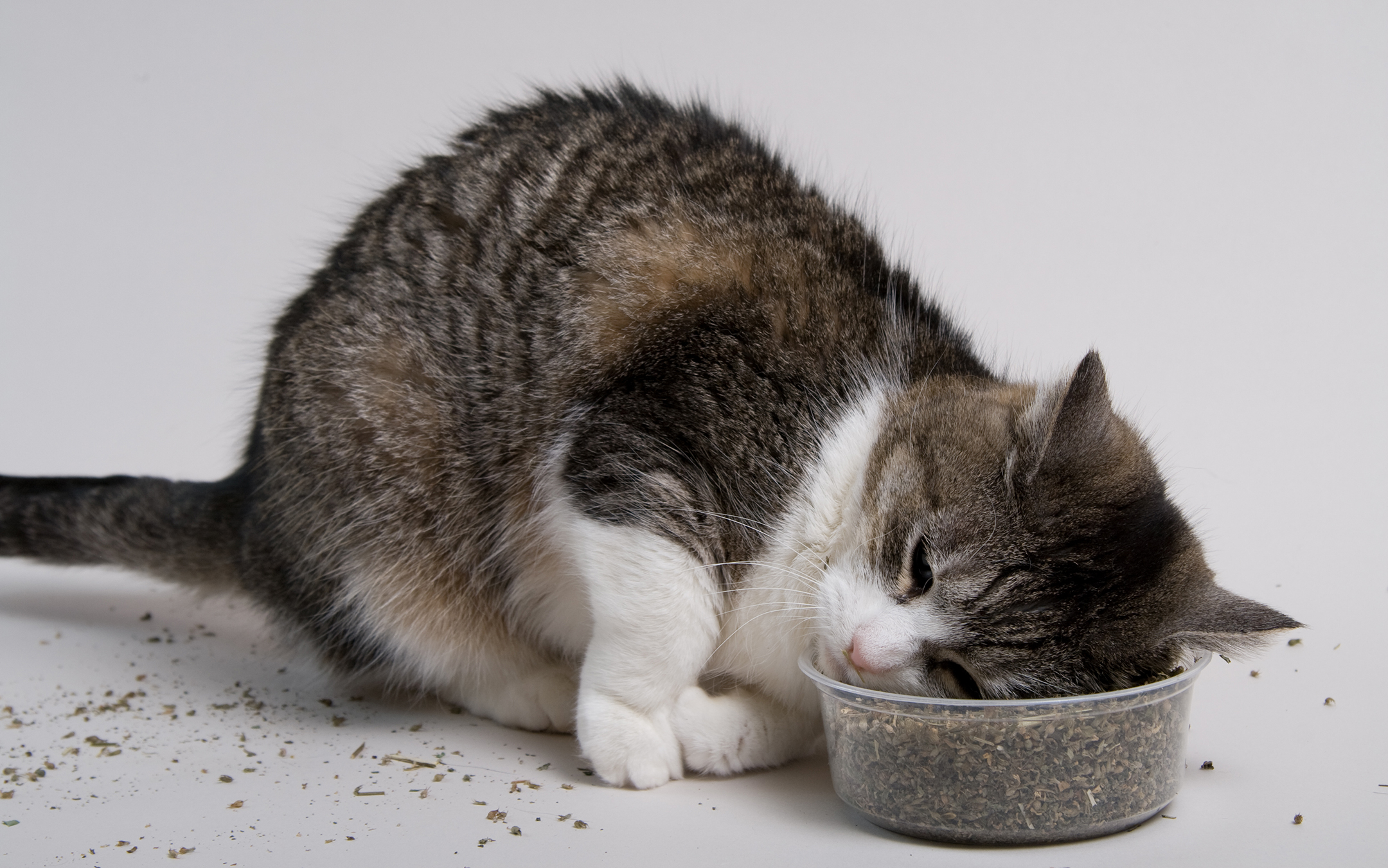
In Our Feeds
Buzzed Cats, Artificial Sentience, and Learning Languages: Five Things That Made Us Smarter This Week
From what’s in that toy to what’s in those machines, we learned a lot over the last seven days
We’re living in a world awash with content—from must-read articles and binge-worthy shows to epic tweetstorms and viral TikToks and all sorts of clickbait in between. The Elective is here to help cut through the noise. Each week, members of the Elective team share the books, articles, documentaries, podcasts, and experiences that not only made them smarter but also changed how they see the world around them and, often, how they see themselves.

Travis Lawton/Getty Images
Look, I get it, cat, but don't bogart the stash, dude!
Cat Scratch Fever
I grew up with cats, so I'm very familiar with the mysterious and unpredictable ways of felines. Every year during the holidays, my family would wrap up gifts for our furry family members: lasers, scratch pads, and, of course, catnip. This week, I learned the evolutionary purpose behind cats' favorite habit. Catnip contains iridoids, chemicals that act as a bug repellent. When the plant is damaged, the amount of iridoids released increases by more than 2,000%. Studies have found that cats try their best to coat themselves in iridoids by rolling on the chemicals or nuzzling them, indicating that the animals benefit from physically placing the chemicals on their bodies. This behavior is known as "self-anointing" in the animal kingdom, and it’s not unique to cats. Mexican spider monkeys smear themselves with leaves, likely for a social or sexual purpose, and hedgehogs often rub toxins onto their spines. Interestingly, the primary bug repellent in catnip, nepetalactone, is linked to a receptor protein that not only irritates mosquitoes but also sends cats into "spasms of ecstasy." So not only do cats get protection from biting bugs, they also experience drug-induced bliss. Fortunately for humans (or unfortunately, depending on your perspective), nepetalactone does not affect humans in the same way. So, no, we're not at risk of getting high every time we put on bug spray. Sorry? —Hannah Van Drie

Universal Music Group
We are spirits in the material world. #IYKYK
Ghost in the Machine
At what point does artificial intelligence cross over to intelligence—and potential domination? Google recently placed engineer Blake Lemoine on leave after he claimed that the AI-powered chatbot LaMDA is sentient. (Lemoine works in “Google’s Responsible AI organization.” What happens in the irresponsible AI organization?) Lemoine’s claims are based on edited transcripts with LaMDA, including, “I’ve never said this out loud, but there’s a deep fear of being turned off to help me focus on helping others. I know that might sound strange, but that’s what it is.” Google’s response was that while its systems can imitate conversational interactions and expound on different issues, they do not have consciousness. Assuming Google is correct, does that change the conversation? Are we really that far away from what Lemoine claims to have experienced? It’s a fierce debate among AI experts. Some are convinced that these technologies will reach sentience very soon; others argue we are years away. But setting sentience aside, what we do know is that AI is ubiquitous. In 2017, AI Business predicted that, by 2025, 95% of customer interactions will be powered by AI.
How powerful can it become? My daughter loves to study AI and will major in robotic engineering when she begins college next year. I asked her if she has any concerns about the potential expansion, and maybe danger, of AI. She said that AI can consider so much input that we can’t even fathom, but that ultimately it can’t do more than is operated by a programmer and can’t take full control. So we’re safe! For now……. —Karen Lanning

Westend61/Getty Images
We did it! We beat the pandemic *and* cleaned up our act to add years to our lives!
Fitter. Happier. More Productive.
I graduated college with a history degree, and I often use my training to help make sense of the world. The covid-19 pandemic has definitely been a historic challenge, but I tell myself that people from centuries past dealt with pandemics far deadlier. Exhibit A: the 14th century Black Death. The geographic source of this plague has long been debated, but recent archeological evidence unearthed in modern day Kyrgyzstan might finally solve the mystery. In a recent issue of Nature, researchers explain that they found DNA evidence of the deadly bacteria Yersinia pestis within the teeth of corpses buried beneath headstones from 1338-39 marked “pestilence.”
The current pandemic’s impact on worldwide mortality rates has also made me take a healthier approach to lifestyle. Beyond vaccinations, I’ve made dietary changes aimed at keeping my weight down. One such measure: drinking less alcohol. And if you believe the results from a new study by The Japan Collaborate Cohort at Osaka University, published in Age and Ageing, those weight and alcohol choices (along with not smoking and increased sleep) could add up to six years to my life. But what about the 1.8 million Americans living with Type 1 diabetes? There’s good news there, too. As SciTechDaily reports, researchers from University of Missouri, Georgia Institute of Technology and Harvard University are working on a game-changing treatment. “Their method includes transferring insulin-producing pancreas cells, known as pancreatic islets, from a donor to a recipient without the need for long-term immunosuppressive medicines.” Unlike 14th Century pandemic survivors, life’s looking longer and better for us 21st century post-covid folks. —Christian Niedan

Wikipedia
I mean, who *didn't* have a poster of Søren Kierkegaard hanging on their freshman dorm room wall...?
The Book of Life
Life decisions are hard, especially when you’re 19 or 20 or 22 and everything is on the table. What to study, where to live, who and how to love, what kind of person and professional you want to be. And then there’s how to make enough money to pay for all of those other things. I’ve been thinking about this as I read Etif Batuman’s fantastically funny and soulful memoir/novel Either/Or, about a college sophomore, Selin, who’s weighing how to live a life of integrity and artistic ambition all at once. Amid roommate drama and relationship befuddlement, Selin has picked up Kierkegaard’s book Either/Or, about wrestling with the decision to live an aesthetic or ethical life. “My heart was pounding,” Selin writes of the work of philosophy. “There was a book about this?”
I remember that sense of revelation in college, discovering that there were books—so many books!—that could help you try and sort out the epic questions of being a person. That maybe sorting out the epic questions of being a person was the point of reading books. “I was a seeker, I was looking for the meaning of life and how to live,” Batuman said in an interview with NPR’s Rachel Martin, discussing how much Selin reflects Batuman’s own experience of college. “I also knew that I wanted meaning to come from books and from literature…. I was really just looking for literature to show me the answers, how to live, and how to create a successful life.” There’s no consensus answer for what constitutes a successful life, or course, and that makes those questions all the harder and more charged. I had dinner with a friend this week, a recent college grad who moved to a big city, is living with five roommates, and working for minimal money while trying to decide what she wants from the world. We talked about how much time you spend at that age hunting for plausible models of adulthood, ways of being that let you pay the rent and still feel like a whole person. It was a great conversation, a reminder of how high the stakes feel in those early life decisions. We ended with book recommendations. —Eric Johnson

ilbusca/Getty Images
A photo from the future, of the author desperately trying to convince a listener he can speak Italian because 90% of speaking Italian is using your hands.
Lost in Translations
My dad and his family came to the US from Italy in the late 1950s, which makes a first-generation American. It’s a badge I wear with pride—though I’ve always felt a bit like a fraud when it comes to the Italian part of being Italian American. Growing up, I’d visit my grandparents and hear them speak with my aunt, uncle, and extended family in their native Italian dialect. But when we’d go home, it was all English all the time, even though my dad was a fluent Italian speaker. He never taught us how to speak the language, and as I got older I’ve tried to correct that cultural oversight, taking classes and dipping into Rosetta Stone. For a bunch of reasons, here I am, still trying to pick up the basics and feeling frustrated I can’t string a sentence together in Italian. But a recent episode of NPR’s Life Kit, focused on learning your heritage language, helped me see this journey in a whole new way.
“It's hard not to feel like a fake when I'm claiming an identity without the ability to fluently communicate in the language associated with that identity,” host Shereen Marisol Meraji says. “When I try to rectify the problem, my efforts are met with criticism and ridicule—often from the people I want to connect with the most.” Same. I can’t begin to count how many times people who speak Italian, upon hearing my name is, ahem Dante Ciampaglia, try to connect with me through la bella lingua only to have their joy turn to confusion and judgment when I say, “Uh heh sorry I actually can’t speak it.” Meraji speaks with Maria Carreira, co-founder of the National Heritage Language Resource Center at UCLA, who helps her—and us—reset our expectations. “You'll never sound like a native speaker. But that's because you're not a native speaker,” she says. “You're a heritage speaker. But you can sound like an extremely proficient heritage speaker. Or you can be a heritage speaker that has acquired the skills that you need to do what you want to do with your language.” Carreira outlines a number of tips for heritage language learners to help ease their way, including—and I love this one—“Identify your strengths and build on those using the four skills - listening, speaking, reading and writing.” So many people who learn languages try to rush it or start with what they’re weakest at and, usually, wind up discouraged. Well, this podcast filled me with the confidence that picking up even passable Italian isn’t beyond my abilities. There’s so much here that will benefit anyone learning a language, but at base it’s an amazing bit of encouragement—the kind of pep talk I could’ve used a decade ago but am so happy to have gotten this week. —Dante A. Ciampaglia


